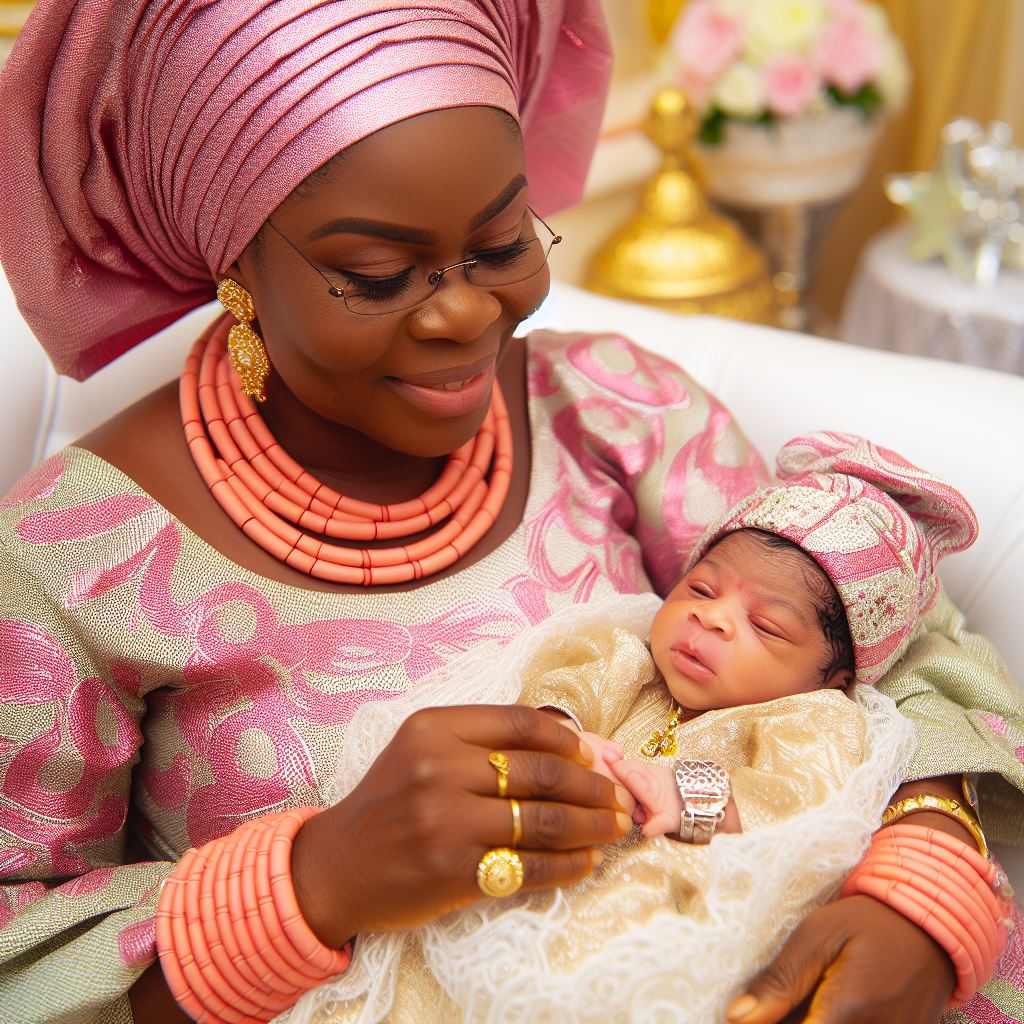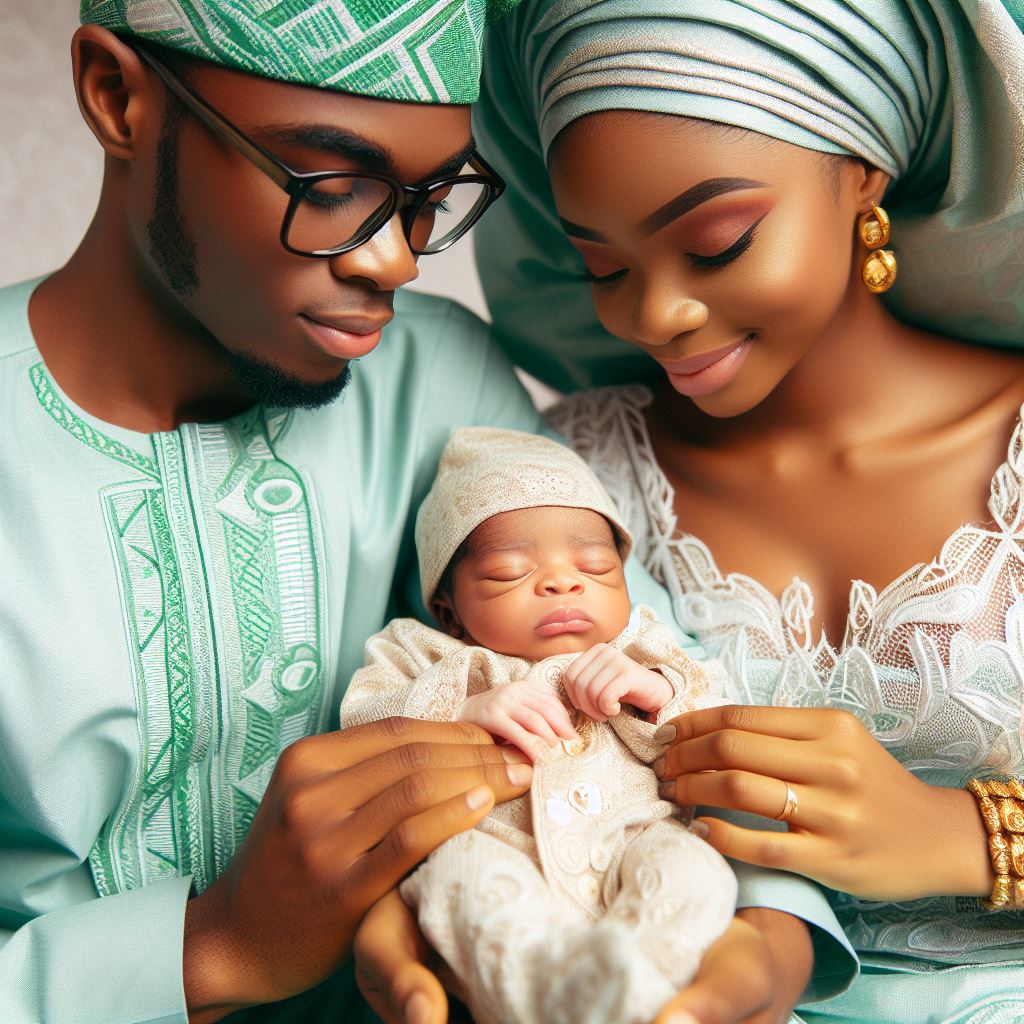Introduction
Baby naming traditions hold significant importance in Nigerian cultures, reflecting the values, beliefs, and identity of the community.
Cultural heritage deeply roots these traditions, honoring ancestors, preserving family lineage, and bestowing blessings on newborns.
In Nigeria, names are not just labels, but powerful expressions of identity and aspirations for children.
They reflect the hopes, dreams, and expectations that parents have for their offspring, as well as the religious beliefs and cultural practices followed in specific regions.
Nigerian communities believe that the name given to a child can influence their destiny, personality, and future success or failure.
Therefore, selecting the right name becomes a matter of great deliberation and importance.
Families exuberantly celebrate baby naming ceremonies, adorning them with intricate rituals, prayers, and joyful feasting.
These ceremonies bring communities together and create a sense of belonging and unity.
Nigeria’s rich cultures showcase diverse names, each holding unique stories, meanings, and symbols reflecting its heritage.
From Yoruba to Igbo, Hausa to Ibibio, the different ethnic groups in Nigeria have distinct naming customs, showcasing the cultural tapestry of the nation.
Understanding these traditions is essential to appreciate the multifaceted nature of Nigerian society and its enduring commitment to preserving heritage and identity through the timeless practice of baby naming.
Yoruba Naming Traditions
Role of family elders and community in the naming ceremony
Yoruba culture imbues the naming ceremony with rich traditions and profound meanings. Families actively engage in this significant event.
Family elders and the community play vital roles in this special occasion.
The family elders, particularly the grandparents, hold a revered position during the naming ceremony.
Believers attribute blessings and good fortune to the newborn due to the wisdom and experience they bring.
Parenting Made Just for You
Get personalized Parenting Solutions tailored to your child’s needs. Transform your parenting journey with expert guidance in 1-3 days.
Get StartedIt is also the responsibility of the family elders to select a suitable name for the baby.
They consult Ifa, a Yoruba deity of divination, who provides guidance and insight into choosing the right name.
The community also plays an essential role in the naming ceremony. The event is seen as a way to introduce the newborn to the community and seek their blessings.
Naming rituals and rituals associated with choosing a name
Yoruba naming rituals are steeped in tradition and symbolism. These rituals serve to honor the ancestors, seek protection, and ensure the child’s prosperous future.
One of the common naming rituals is the pouring of water. Water purifies, cleansing the baby’s spirit, preparing them for life’s journey with its purifying element.
Another important ritual is the offering of kolanut. Kolanut is a sacred nut in Yoruba tradition, symbolizing fertility, hospitality, and unity.
The family offers blessings-seeking to ancestors and deities for the baby’s well-being.
Before choosing a name, the family may also consult Ifa for guidance.
They may seek the help of a Babalawo, a Yoruba diviner, who reads Ifa’s signs and provides a selection of names that align with the child’s destiny.
Common Yoruba names and their meanings
Yoruba names often carry significant meanings and reflect the family’s aspirations for the child. Here are some common Yoruba names and their meanings:
- Adeola – The crown brings honor.
- Ayodele – Joy has come home.
- Olumide – My God has come.
- Funmilayo – Give me joy.
- Adeyemi – The crown suits me.
- Ayomide – My joy has arrived.
- Olabisi – Wealth keeps multiplying.
- Adeola – The crown of wealth.
- Ayọ – Joy.
- Olumayowa – God favors me.
These names not only provide individual identity but also connect the child to their Yoruba cultural heritage and values.
In essence, Yoruba naming traditions are rich in symbolism and deeply rooted in community and ancestral ties.
The involvement of family elders and the community adds a sense of collective responsibility and support in welcoming the new life into the world.
Through naming rituals and the careful selection of meaningful names, the Yoruba culture ensures that each child carries a strong sense of identity and purpose as they navigate their journey through life.
Unveil the Perfect Name that Tells Your Family's Story
Let us help you find a name that embodies your family's values, traditions, and dreams. Our personalized consultation weaves cultural insights to create a name that's uniquely yours.
Get StartedRead: Balancing Work & New Parenthood in Nigeria
Hausa Naming Traditions
Importance of Islamic Influence on Hausa Naming Traditions
The Hausa people, predominantly found in Northern Nigeria, have a strong Islamic influence on their naming traditions.
Islam plays a significant role in shaping the way Hausa people name their children.
- Quranic Names: Hausa parents often choose names that have a direct association with the Quran. These names are thought to bring blessings and protection to the child.
- Muhammad as a Popular Name: The name Muhammad is highly popular among Hausa families, as it is the name of the Islamic prophet. It represents a deep religious devotion and respect for Prophet Muhammad.
- Meaningful Arabic Names: Arabic names are widely used by the Hausa community due to their religious significance. These names are chosen for their beauty, elegance, and often carry a spiritual or cultural meaning.
Naming Ceremony Customs and Practices
The Hausa people have specific customs and practices surrounding the naming ceremony of a newborn child.
These rituals hold great importance in their culture and provide a sense of identity and belonging.
- Aso Dara: The naming ceremony, known as “Aso Dara” in the Hausa language, usually takes place on the seventh day after the birth of the child. It is a joyous occasion that brings family and friends together.
- Spiritual Blessings: During the Aso Dara ceremony, an Islamic cleric recites prayers, offers spiritual blessings, and selects a suitable name for the newborn based on Islamic teachings and traditions.
- Feasting and Celebration: The naming ceremony is followed by a festive gathering where relatives and well-wishers celebrate the arrival of the newborn. There is often music, dancing, and feasting on traditional Hausa delicacies.
Popular Hausa Names and Their Significance
Hausa names are rich in cultural and historical significance, often reflecting the traits or values parents hope their child will possess.
- Usman: Derived from Arabic, this name means “trustworthy” and is often given to boys to honor the second caliph of Islam, Usman ibn Affan.
- Aisha: Meaning “alive” or “she who lives,” Aisha is a popular name among Hausa girls, symbolizing strength, intelligence, and resilience.
- Abdullahi: This name, derived from the Arabic “Abdullah,” means “servant of Allah” and represents deep religious devotion and humility.
- Fatima: A name of Arabic origin, Fatima holds great significance in Islamic history as the daughter of Prophet Muhammad. It signifies purity and righteousness.
- Sani: Sani, meaning “praise” or “glory,” is a common Hausa name given to boys. It embodies the desire for the child to be successful and praised by others.
The Hausa people’s naming traditions deeply reflect Islam, influenced by their faith, culture, and values.
The importance of Islamic teachings, the rituals of naming ceremonies, and the significance of popular Hausa names all contribute to preserving the rich heritage of the Hausa culture in Nigeria.
Read: Newborn Care: Nigerian Customs and Modern Tips
Igbo Naming Traditions
Significance of ancestral ties in Igbo naming traditions
In Igbo culture, names hold immense cultural and spiritual importance.
They serve as a way to honor ancestors, connect with the divine, and shape the destiny of the child.
Naming ceremonies are joyful and elaborate affairs, involving the entire community.
The names given during these ceremonies carry profound meanings and reflect the beliefs and values of the Igbo people.
The emphasis on ancestral ties in Igbo naming traditions is evident.
Ancestral names link each child to their past, forging identity and continuity, fostering a profound sense of connection.
Ancestors guide and protect newborns throughout life via their names, believed to hold this power.
Naming rituals and cultural beliefs associated with naming newborns
Igbo naming rituals are vibrant and engaging. Family members and community elders play key roles in the naming ceremony, offering blessings and prayers for the child’s future.
Pour libations to honor the ancestors and seek blessings and protection for both the child and them.
The choice of names in Igbo culture is not arbitrary. Names are carefully selected to convey meaningful messages.
For example, the name Chukwuemeka celebrates the greatness of God, while Nneka acknowledges the supreme role of mothers.
Each name carries a cultural and spiritual significance, shaping the child’s identity and fostering a strong connection to their heritage.
Notable Igbo names and their meanings
Notable Igbo names reflect the rich linguistic and cultural tapestry of the ethnic group.
Chidinma encapsulates the beauty and goodness of God, while Ifeanyi emphasizes the limitless power of the divine.
These names are not just labels but powerful declarations of faith and belief.
Igbo naming traditions intertwine ancestral ties, cultural beliefs, and spiritual significance in their roots. These traditions deeply influence naming.
Carefully chosen names honor the past, shaping a child’s future while connecting them to it.
The vibrant naming ceremonies and the profound meanings behind Igbo names serve as a testament to the importance of culture and tradition in Nigerian societies.
Read: Breastfeeding Basics for Nigerian New Mothers

Other Nigerian Ethnic Groups
Overview of naming traditions in other Nigerian ethnic groups (e.g., Ijaw, Efik, Tiv)
Ijaw Naming Traditions
- The Ijaw people have a unique naming system based on the day a child is born.
- Each day is associated with a specific name, and the child is given that name.
- These names have deep meanings and symbolize the characteristics and destiny of the child.
Efik Naming Traditions
- The Efik people believe that names have significant spiritual and social implications.
- They often name their children after notable ancestors or deities to honor them.
- It is believed that giving a child a prestigious name can ensure the child’s success.
Tiv Naming Traditions
- The Tiv people see the naming ceremony as an important event to introduce a child to their community.
- They often have several names for a child, including an inherited family name and a day of the week name.
- The day of the week name is believed to influence the child’s character and behavior.
Unique customs and practices observed during naming ceremonies in these groups
Ijaw Naming Ceremonies
- The Ijaw celebrate the birth of a child with a colorful ceremony called “Ibinabo.”
- During this ceremony, the child is bathed in special herbs and given the designated name.
- Family and friends gather to rejoice, sing, dance, and feast on traditional dishes.
Efik Naming Ceremonies
- For the Efik people, naming ceremonies are elaborate and involve various rituals.
- The child is presented to the community in a grand celebration filled with cultural performances.
- There is usually a feast where traditional delicacies like Afang soup and Edikang Ikong are served.
Tiv Naming Ceremonies
- The Tiv naming ceremony, known as “Iorver,” is a communal event that signifies unity.
- The extended family, friends, and neighbors come together to celebrate and bless the child.
- The ceremony includes prayers, sacrifices, and the sharing of food and drinks.
In general, Nigerian ethnic groups like the Ijaw, Efik, and Tiv have distinct naming traditions.
These traditions reflect their beliefs, values, and the importance they place on names.
The naming ceremonies in these groups are joyful occasions that involve family, friends, and the community.
Through these ceremonies, they honor their heritage and ensure the child’s successful future.
Read: Nigerian Maternity Wears: Style & Comfort Tips
Common Themes and Variances
Commonalities and differences among Nigerian naming traditions
In Nigeria, naming traditions are an important aspect of the country’s diverse cultures.
Naming practices show commonalities and differences across cultures, revealing diverse yet interconnected approaches. These practices exhibit varied but interconnected elements.
- Family Names: One common theme in Nigerian naming traditions is the use of family names. These names are often passed down from generation to generation, linking individuals to their ancestors and creating a sense of familial identity.
- Naming after Events: Another common tradition is naming children after significant events in the family or community. For example, a child may be named “Ifeoluwa,” meaning “love of God,” if they are born during a period of great religious significance.
- Naming after Deities: In some Nigerian cultures, names are given after deities or spiritual beings believed to have influence and protection over the child. This reflects the strong traditional and spiritual beliefs in the country.
- Gender-Specific Names: Like many cultures, Nigerian naming traditions often include gender-specific names. Certain names are reserved for boys, while others are exclusively for girls. These names often carry specific meanings and connotations based on the gender they are assigned to.
- Regional Variation: Despite these commonalities, there are significant regional variations in naming traditions across Nigeria. Each ethnic group has its own unique naming customs, influenced by their history, language, and cultural practices.
The influence of religion and cultural values on baby naming
Religion and cultural values play a significant role in shaping Nigerian baby naming traditions.
They provide a framework and guide for the choice of names and reflect the deep-rooted beliefs of the Nigerian people.
- Christianity: Due to the widespread influence of Christianity in Nigeria, many Christian families choose biblical names for their children. These names signify a connection to their faith and often exemplify virtues and traits valued within the Christian community.
- Islamic Influence: In regions with a large Muslim population, Islamic names are prevalent. These names often have Arabic origins and reflect the importance of Islamic teachings and values within the community.
- Cultural Significance: Nigerian cultures place a strong emphasis on preserving cultural traditions, and naming is no exception. Names reflect cultural values, emphasizing bravery, honor, respect, or beauty in their choice.
- Ancestor Worship: Some Nigerian cultures believe in ancestor worship and give names that honor deceased relatives. This practice reinforces the connection between the past, present, and future generations, ensuring the continuity of family ties.
- Modern Influences: In recent years, there has been a rise in the adoption of Western names due to globalization and the influence of popular culture. However, many Nigerians still maintain a balance between modern trends and traditional naming practices.
In a nutshell, Nigerian naming traditions exhibit both common themes and variances.
Family names, events, deities, and gender-specific names are common across different cultures.
Religion and cultural values strongly influence name choices, with Christianity, Islamic traditions, and cultural significance playing significant roles.
Understanding these commonalities and variations enriches our appreciation of Nigerian culture and the importance of names in their society.
Impact on Modern Nigerian Society
Evolution of baby naming traditions in urban areas and diaspora communities
The naming traditions in urban areas and diaspora communities of Nigeria have significantly evolved over time.
- Western Influence: The introduction of Western culture has influenced the adoption of non-traditional names.
- Globalization: With increased exposure to diverse cultures, Nigerian urban areas and diaspora communities embrace international naming trends.
- Creative Names: There is a rise in the popularity of unique and creative names that reflect individualism and personalization.
- Gender-Neutral Names: Traditional gender-specific names are gradually being replaced by gender-neutral names that promote equality.
- Blending of Cultures: Urban areas and diaspora communities tend to blend Nigerian naming practices with those of other cultures, creating hybrid names.
Factors influencing changes in naming practices over time
Multiple factors have contributed to the changes in baby naming practices in modern Nigerian society.
- Education: Increasing education levels have led to a desire for names that sound more sophisticated and globally recognized.
- Religion: Religious beliefs, such as Christianity and Islam, have influenced the adoption of names with religious significance.
- Western Media Influence: Nigerian society’s exposure to Western media has popularized Western names and naming styles.
- Migration and Urbanization: The movement of Nigerians to urban areas and diaspora communities has exposed them to different naming practices, leading to changes in their own traditions.
- Cultural Diversity: Nigeria’s diverse ethnic groups have influenced each other’s naming practices, resulting in a fusion of traditions.
Basically, the impact of modernization on baby naming traditions in Nigerian society has been significant.
Urban areas and diaspora communities have witnessed an evolution in naming practices, influenced by Western culture, globalization, creativity, and gender equality.
Factors such as education, religion, Western media influence, migration, urbanization, and cultural diversity have also played a role in shaping these changes.
As Nigerian society continues to evolve, baby naming traditions will likely continue to adapt and reflect the dynamic nature of the country’s culture and influences.
Conclusion
Recapitulation of Baby Naming Traditions’ Significance in Nigerian Cultures
Nigerian baby naming customs, deeply rooted in heritage, symbolize ancestry and beliefs within the culture.
They embody familial ties, honoring ancestors, and invoking blessings upon newborns.
These naming rituals vary across Nigeria’s diverse ethnic groups, showcasing rich traditions passed down through generations.
From the Yoruba’s “Oruko Amutorunwa” to the Igbo’s “Igu Afa,” each ceremony holds unique significance.
The names bestowed upon children often carry meanings linked to aspirations, circumstances, or attributes desired for their future.
They encapsulate hopes, aspirations, and familial expectations within a single word.
Moreover, these naming traditions serve as a connection to cultural identity, fostering a sense of belonging and pride.
They reinforce the importance of heritage and communal values, strengthening family bonds and societal cohesion.
Encouragement to Embrace and Respect Diverse Naming Traditions in Nigeria
Embracing and respecting the diverse baby naming customs in Nigeria is crucial for fostering unity and understanding.
It is a celebration of the country’s rich tapestry of cultures, showcasing the beauty of diversity.
By honoring and learning about these naming traditions, individuals can deepen their appreciation for the multifaceted nature of Nigerian heritage.
It fosters cultural appreciation and promotes inclusivity within society.
Respecting these customs also involves acknowledging the significance they hold for different communities.
It requires openness, acceptance, and a willingness to learn and celebrate the uniqueness of each tradition.
Nigerian baby naming traditions are more than just names; they are a reflection of profound cultural values, beliefs, and identities.
Embracing and respecting this diversity can bridge cultural gaps, fostering harmony and mutual respect within the country’s vibrant tapestry of cultures.




